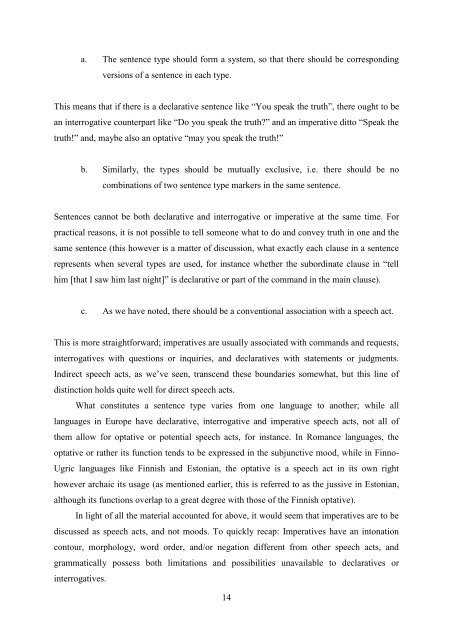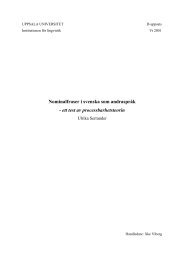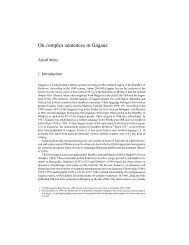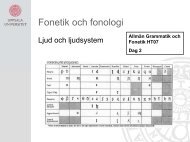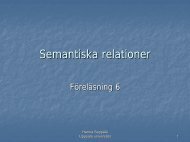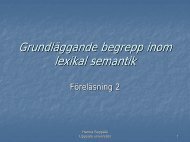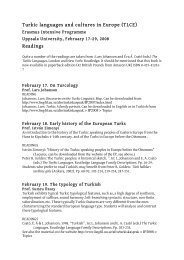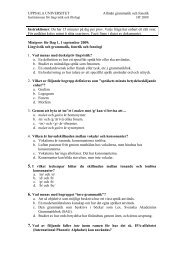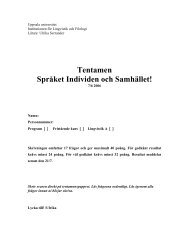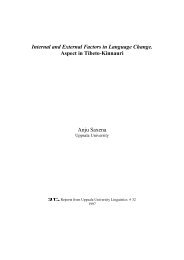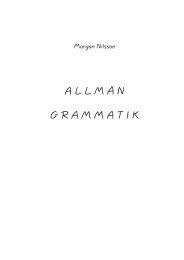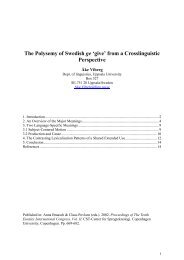The function of non-canonical imperatives in the languages of Europe
The function of non-canonical imperatives in the languages of Europe
The function of non-canonical imperatives in the languages of Europe
Create successful ePaper yourself
Turn your PDF publications into a flip-book with our unique Google optimized e-Paper software.
a. <strong>The</strong> sentence type should form a system, so that <strong>the</strong>re should be correspond<strong>in</strong>g<br />
versions <strong>of</strong> a sentence <strong>in</strong> each type.<br />
This means that if <strong>the</strong>re is a declarative sentence like “You speak <strong>the</strong> truth”, <strong>the</strong>re ought to be<br />
an <strong>in</strong>terrogative counterpart like “Do you speak <strong>the</strong> truth” and an imperative ditto “Speak <strong>the</strong><br />
truth!” and, maybe also an optative “may you speak <strong>the</strong> truth!”<br />
b. Similarly, <strong>the</strong> types should be mutually exclusive, i.e. <strong>the</strong>re should be no<br />
comb<strong>in</strong>ations <strong>of</strong> two sentence type markers <strong>in</strong> <strong>the</strong> same sentence.<br />
Sentences cannot be both declarative and <strong>in</strong>terrogative or imperative at <strong>the</strong> same time. For<br />
practical reasons, it is not possible to tell someone what to do and convey truth <strong>in</strong> one and <strong>the</strong><br />
same sentence (this however is a matter <strong>of</strong> discussion, what exactly each clause <strong>in</strong> a sentence<br />
represents when several types are used, for <strong>in</strong>stance whe<strong>the</strong>r <strong>the</strong> subord<strong>in</strong>ate clause <strong>in</strong> “tell<br />
him [that I saw him last night]” is declarative or part <strong>of</strong> <strong>the</strong> command <strong>in</strong> <strong>the</strong> ma<strong>in</strong> clause).<br />
c. As we have noted, <strong>the</strong>re should be a conventional association with a speech act.<br />
This is more straightforward; <strong>imperatives</strong> are usually associated with commands and requests,<br />
<strong>in</strong>terrogatives with questions or <strong>in</strong>quiries, and declaratives with statements or judgments.<br />
Indirect speech acts, as we’ve seen, transcend <strong>the</strong>se boundaries somewhat, but this l<strong>in</strong>e <strong>of</strong><br />
dist<strong>in</strong>ction holds quite well for direct speech acts.<br />
What constitutes a sentence type varies from one language to ano<strong>the</strong>r; while all<br />
<strong>languages</strong> <strong>in</strong> <strong>Europe</strong> have declarative, <strong>in</strong>terrogative and imperative speech acts, not all <strong>of</strong><br />
<strong>the</strong>m allow for optative or potential speech acts, for <strong>in</strong>stance. In Romance <strong>languages</strong>, <strong>the</strong><br />
optative or ra<strong>the</strong>r its <strong>function</strong> tends to be expressed <strong>in</strong> <strong>the</strong> subjunctive mood, while <strong>in</strong> F<strong>in</strong>no-<br />
Ugric <strong>languages</strong> like F<strong>in</strong>nish and Estonian, <strong>the</strong> optative is a speech act <strong>in</strong> its own right<br />
however archaic its usage (as mentioned earlier, this is referred to as <strong>the</strong> jussive <strong>in</strong> Estonian,<br />
although its <strong>function</strong>s overlap to a great degree with those <strong>of</strong> <strong>the</strong> F<strong>in</strong>nish optative).<br />
In light <strong>of</strong> all <strong>the</strong> material accounted for above, it would seem that <strong>imperatives</strong> are to be<br />
discussed as speech acts, and not moods. To quickly recap: Imperatives have an <strong>in</strong>tonation<br />
contour, morphology, word order, and/or negation different from o<strong>the</strong>r speech acts, and<br />
grammatically possess both limitations and possibilities unavailable to declaratives or<br />
<strong>in</strong>terrogatives.<br />
14


